 “An artist is almost always something of an embarrassment to his work.”
“An artist is almost always something of an embarrassment to his work.”
Anthony Powell, A Writer’s Notebook
Terry Teachout on the arts in New York City
Courtesy of Hannah Gersen by way of Karigee, this literary list. One or two questions failed to ring my bell, but for the most part I found them stimulating and, on occasion, provocative:
PART ONE
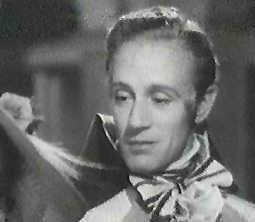 1. What was your favorite book as a child? Oddly enough, I don’t remember reading children’s books, though I know I did. The first novel that I clearly recall reading through the eyes of a child was The Scarlet Pimpernel, which I adored. I reread it as an adult with only modest pleasure, but the 1934 film version in which Leslie Howard plays Sir Percy Blakeney remains a favorite.
1. What was your favorite book as a child? Oddly enough, I don’t remember reading children’s books, though I know I did. The first novel that I clearly recall reading through the eyes of a child was The Scarlet Pimpernel, which I adored. I reread it as an adult with only modest pleasure, but the 1934 film version in which Leslie Howard plays Sir Percy Blakeney remains a favorite.
2. What’s the last really good book you read? I’m currently reading Man in Profile, Thomas Kunkel’s biography of Joseph Mitchell. It’s exactly the kind of book I like to read and try to write.
3. Do you prefer fiction or nonfiction? Why? Nonfiction, but not by much. I don’t know why, but I’ve always had this preference.
4. Do you finish every book that you start? If you don’t, how do you decide when to stop reading? Unless money is changing hands, I stop when I get bored.
5. List your ten favorite books in four minutes or less. Write it down because you’ll revisit it at the end.
W. Jackson Bate, Samuel Johnson
Max Beerbohm, And Even Now
David Cairns, Berlioz
Peter De Vries, The Blood of the Lamb
James Gould Cozzens, Guard of Honor
Moss Hart, Act One
Flannery O’Connor, The Habit of Being
Anthony Powell, A Dance to the Music of Time
Dawn Powell, The Locusts Have No King
Anthony Trollope, The Way We Live Now
6. Do you reread books? Which ones? All the time.
7. Do you read poetry? Why or why not? Not very often. I’m too narrative-driven to enjoy it as much as I should. I did, however, read a considerable amount of poetry in my youth, and I still draw on the imaginative capital that I accumulated back then. (The only major poet whose work I first encountered in adulthood and came to love at once is Philip Larkin.)
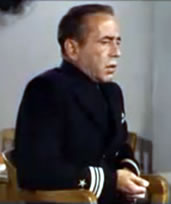 8. Do you remember the first “grown-up” book you read? I’m pretty sure it was either Allen Drury’s Advise and Consent or Herman Wouk’s The Caine Mutiny, both of which I had initially read as Reader’s Digest Condensed Books.
8. Do you remember the first “grown-up” book you read? I’m pretty sure it was either Allen Drury’s Advise and Consent or Herman Wouk’s The Caine Mutiny, both of which I had initially read as Reader’s Digest Condensed Books.
9. Are there any authors whose work you have read completely? None, if by that you mean absolutely every published word. I have, however, read all of the books of a great many writers (a word I far prefer to “authors,” by the way).
10. How often do you read books that are more than one hundred years old? Reasonably often, but I’m rather more likely at any given moment to be reading a book that is less old than that. This is, I’m sure, a journalist’s bias.
11. Is there a type (or types) of book you never read? Self-help books and novels for young adults. Nothing personal—I have friends who write in both genres. They’re just not my thing. (I tried the Harry Potter books out of cultural curiosity, but gave them up after the second or third volume.)
12. How do you choose what to read? I follow my nose.
PART TWO
13. What’s more important to you: the way a book is written, or what the book is about? To me, they’re consubstantial. If a book is poorly written, though, I’ll find it difficult to read no matter how interesting the subject is to me. (I can’t read Theodore Dreiser or Sinclair Lewis, for instance.)
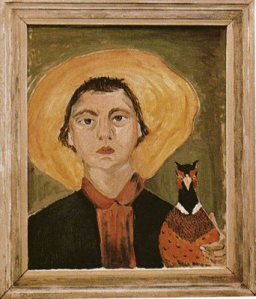 14. What author, living or dead, would you most like to have dinner with? Probably Flannery O’Connor, though I can imagine regretting the choice after the fact. I expect she could be a tricky dinner companion.
14. What author, living or dead, would you most like to have dinner with? Probably Flannery O’Connor, though I can imagine regretting the choice after the fact. I expect she could be a tricky dinner companion.
15. If you could hang out with a literary character for the day, who would it be? Hugh Moreland, in A Dance to the Music of Time. (Strange that I should choose a male character, since nearly all of my real-life friends are women, but there it is.)
16. If you could be a literary character, who would it be? Nick Jenkins, the narrator of A Dance to the Music of Time. I fear, however, that I’m more like Charles Gray, in John P. Marquand’s Point of No Return.
17. Have you ever written a fan letter to an author? Many times. I believe devoutly in paying compliments. The first fan letter I ever wrote to a famous author I’d never met was to E.B. White, back when I was in college. (I long ago changed my mind about White, alas.)
18. Is there any book that, if I professed to love it, you would be turned off? Is there any book that would impress you in particular? No, to both questions. People are more important than books.
19. Is there a book you feel embarrassed about liking? I don’t embarrass that easily.
20. Are there books you feel proud of liking or having finished? That seems an absurd reason to be proud.
21. Have you ever lied about having read a book? In my not-so-innocent youth, I actually dared to review the biography of a writer of fiction whose works I’d never read (and still haven’t).
22. Do you keep track of the books you read? Only by writing about them, when I do. (The daily almanac posting on this blog sometimes offers clues as to what I’ve been reading lately.)
23. How do you form opinions about what you read? How do you form opinions? Do you have a machine at home, or do you send your first impressions out with the wash?
24. What authors do you think are overrated? Underrated? I certainly hope Dickens is overrated, because if he’s not, I’m really missing out on something. James Gould Cozzens, Somerset Maugham, and Edwin O’Connor, by contrast, are definitely underrated. (Colette isn’t so much underrated as insufficiently known, at least in this country.)
PART THREE
25. Do you ever read self-help books? You already asked me that, sort of.
26. What’s a book that shocked you? I don’t recall ever having been shocked by a book—at least not since I’ve been an adult.
27. If you could force every person you know to read one book, what would it be? Boswell’s Life of Johnson.
28. What book would you recommend to me in particular? I don’t know you.
29. What books/authors have you been meaning to read for years? Why haven’t you read them yet? Dickens again! I have what appears to be a permanent allergy to his work—there’s something about his prose that puts me off, and always has.
30. What kind of book do you consider “a guilty pleasure?” I don’t have guilty pleasures. I like what I like, period.
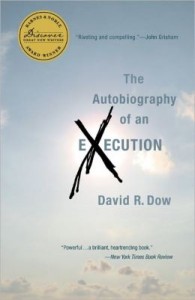 31. Has a book ever changed your mind about something? David R. Dow’s The Autobiography of an Execution changed my mind about the death penalty.
31. Has a book ever changed your mind about something? David R. Dow’s The Autobiography of an Execution changed my mind about the death penalty.
32. If you were terminally ill, what book or books would you read? I don’t think that knowledge would change my reading habits. Work excluded, I read solely for pleasure.
33. Do you have any passages of poetry or prose committed to memory? Can you recite something to me?
Man hands on misery to man.
It deepens like a coastal shelf.
Get out as early as you can,
And don’t have any kids yourself.
I had to double-check the punctuation, but I got the words exactly right.
34. If you could change anything about the way you read, what would it be? Not a thing—except maybe to read more poetry.
35. Was there any time in your life when you felt as if a book guided you in a profound way? Not in the way I think you have in mind. Books have taught me hugely important things about life and art, but I wouldn’t say that there is any one book I’ve lived by.
36. Return to the list you made at the beginning. What titles, if any, would you change after our conversation? Not a one.
* * *
UPDATE: To read Patrick Kurp’s answers to the same questions, go here.
I left the theater and stood for a long time on the steps leading down to the street, taking deep breaths of the cold night air, filled with a warmth that seemed to buoy me up. Then I flagged a cab, and as we drove down Broadway, I experienced an astonishing sense of release reminiscent of the ecstatic muscular exhaustion you feel after hard physical labor. It was as if all the cares of living in New York City, all the strains of my life, were slipping from my shoulders. The world around me appeared numinous, and I accepted everything in it, even the bright blue graffiti on a passing truck….
Read the whole thing here.
 On Friday afternoon I taped an episode of Theater Talk with Ben Brantley of the New York Times, Peter Marks of the Washington Post, and John Simon, who is about to turn ninety. It was fun, but it also felt strange, very much so. I never imagined that I’d become the drama critic of The Wall Street Journal until it happened. Now I’ve been doing it for twelve years, and I just taped a TV show with a colleague whose work I first read when I was in high school. Back then, and for years afterward, I envisioned any number of possible fates for myself. None of them bore the slightest resemblance to the life I lead today.
On Friday afternoon I taped an episode of Theater Talk with Ben Brantley of the New York Times, Peter Marks of the Washington Post, and John Simon, who is about to turn ninety. It was fun, but it also felt strange, very much so. I never imagined that I’d become the drama critic of The Wall Street Journal until it happened. Now I’ve been doing it for twelve years, and I just taped a TV show with a colleague whose work I first read when I was in high school. Back then, and for years afterward, I envisioned any number of possible fates for myself. None of them bore the slightest resemblance to the life I lead today.
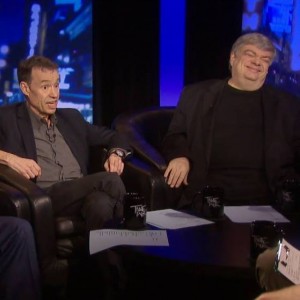 If this story has a moral, it’s that nothing—nothing—is foreseeable. Like the song says, life is pandemonium. The trick, I guess, is to accept amazement as a given, and that’s what I try to do. But it grows harder with every passing year. More and more I feel like one of those characters in the novels of John P. Marquand who suddenly realizes as he passes into middle age that he has no understanding whatsoever of the meaning (if any) of his life.
If this story has a moral, it’s that nothing—nothing—is foreseeable. Like the song says, life is pandemonium. The trick, I guess, is to accept amazement as a given, and that’s what I try to do. But it grows harder with every passing year. More and more I feel like one of those characters in the novels of John P. Marquand who suddenly realizes as he passes into middle age that he has no understanding whatsoever of the meaning (if any) of his life.
Saul Bellow, of all people, reviewed Marquand’s Melville Goodwin USA in Commentary in 1952, four years before I was born and fifty-seven years before I became that same magazine’s critic-at-large. He captured in his review a sliver of what I’ve been feeling lately:
The narrator and sub-hero of Marquand’s novel is a journalist, Sidney Skelton, who becomes a radio news commentator. This happens in a wholly accidental manner; a radio executive is struck by the quality of “sincerity” in his voice, gets him a program, and makes him rich and famous. Quite suddenly Skelton is surrounded by luxury; he owns a large country house, a chauffeur brings him to town, and above the thunder of Manhattan he sits in a leather-upholstered office and talks to the nation. Naturally, he can’t feel that his success is real…
Life changes so swiftly for the successful man, the new is so overpowering, that he can only pretend to know where he is, to know what to do, how to appear, what to say, how to occupy his position.
Unlike Sidney Skelton, I don’t have a chauffeur or a large, luxurious country house, but I do live in an art-filled apartment in upper Manhattan, and there are times when the art seems more real to me than I do. Mrs. T is entirely real, of course, and so are my friends, and once in a while I’m reminded that I’ve done things that have changed the lives of other people for the better. Just the other day I got an e-mail from a performer about whom I wrote a piece many years ago that was, as she put it, a “turning point” in her career. “I will never forget it,” she said. “Thank you for all you have given me.” That was real, too. So is the overflowing shelf of books that I’ve written and edited in the past quarter-century. But what about me? Am I as real as any of these things?
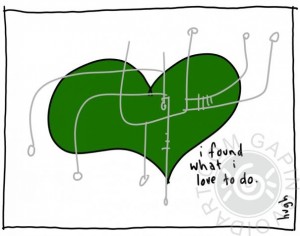 I suppose I might feel more solidly rooted in the world if, like my brother, I’d had a child somewhere along the way. Instead I’ve had books—and, now, a play and three operas—and I’m proud of them all. I’m proud, too, that I’ve figured out how to earn a living doing all kinds of things that I love to do. I know most of the people in the world aren’t nearly so lucky, and I have the common decency to be grateful for my luck. Yet I find it impossible to understand. I want my life to make more sense than it does. I’d like to be able to look back to a specific moment in my childhood and say, That’s when it all began, and I can’t do it.
I suppose I might feel more solidly rooted in the world if, like my brother, I’d had a child somewhere along the way. Instead I’ve had books—and, now, a play and three operas—and I’m proud of them all. I’m proud, too, that I’ve figured out how to earn a living doing all kinds of things that I love to do. I know most of the people in the world aren’t nearly so lucky, and I have the common decency to be grateful for my luck. Yet I find it impossible to understand. I want my life to make more sense than it does. I’d like to be able to look back to a specific moment in my childhood and say, That’s when it all began, and I can’t do it.
The closest I can come is to remember what it felt like to watch What’s My Line? on TV with my family, an experience that I wrote about in a memoir of my childhood:
For me, it was a ceremony, a mystical rite that opened a window on the unknown world far beyond the city limits of my home town….
The panelists on What’s My Line?, I realized as I watched them week after week, knew each other; they were fellow members of the freemasonry of celebrity, and they convened each Sunday in a television studio in New York, capital of the world, for the sole purpose of entertaining me. As I watched them, I imagined New York to be a place that existed only for the collective pleasure of the rich and famous. To live in New York, I felt certain, was to go to opening nights on Broadway, eat at inconceivably fancy restaurants, appear on What’s My Line?, and be friends with lots of other famous people. I could not imagine living there myself, but it was enough to watch What’s My Line? and dream, and I did plenty of both.
And now…here I am. Not rich, not famous, but most definitely a New Yorker, one who sits on the aisle instead of merely dreaming about it and—every once in a while—pops up on TV. Not on What’s My Line?, though, for it was canceled by CBS in 1967, seven years before I pulled up stakes and left Smalltown, U.S.A., to begin the impossible journey from there to here and then to now.
* * *
The original cast of The 25th Annual Putnam County Spelling Bee sings “Pandemonium,” by William Finn:
The final episode of the original network run of What’s My Line? John Daly is the host and the panelists are Martin Gabel, Arlene Francis, Steve Allen, and Bennett Cerf. I watched this episode when it aired in 1967:
Nobody practices everything they preach, and in the cases of certain people, the practice-preach ratio is quite spectacularly out of whack. While I think my ratio is reasonably healthy, one thing that I recommend wholeheartedly to students but have never managed to do for myself is keep a writer’s notebook. (My excuse is that this blog is to some degree a substitute, but I know that’s only an excuse.) When a writer of quality publishes such a notebook, as Somerset Maugham did in 1949, the results are invariably illuminating—if not necessarily in the way that the writer in question had in mind.
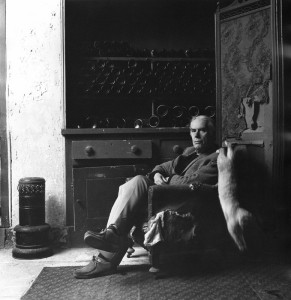 I wasn’t aware that Anthony Powell had gotten on the bandwagon until Levi Stahl started tweeting entries from his notebook. It was published a year after Powell’s death in 2000, though my impression is that it was his intention for A Writer’s Notebook to appear while he was still alive. It’s not intimate in any way, merely a 169-page collection of phrases and aperçus that he scribbled down at odd intervals for possible use in his novels and essays. Even so, it is still immensely revealing of Powell’s distinctive turn of mind, not least because a modest number of the entries made it into A Dance to the Music of Time, Powell’s twelve-volume novelistic masterpiece, usually but not always in altered form.
I wasn’t aware that Anthony Powell had gotten on the bandwagon until Levi Stahl started tweeting entries from his notebook. It was published a year after Powell’s death in 2000, though my impression is that it was his intention for A Writer’s Notebook to appear while he was still alive. It’s not intimate in any way, merely a 169-page collection of phrases and aperçus that he scribbled down at odd intervals for possible use in his novels and essays. Even so, it is still immensely revealing of Powell’s distinctive turn of mind, not least because a modest number of the entries made it into A Dance to the Music of Time, Powell’s twelve-volume novelistic masterpiece, usually but not always in altered form.
Anyone who has read Dance knows that its author had a sententious streak, but one that is far more attractive than the most familiar usage of that ambiguous word suggests. Nick Jenkins, the fictional narrator who represents Powell in A Dance to the Music of Time, is given to tossing off aphoristic observations at not-infrequent intervals, many of which are quite exceedingly wise and provocative. (This one, from Casanova’s Chinese Restaurant, is my favorite: “In the end most things in life—perhaps all things—turn out to be appropriate.”)
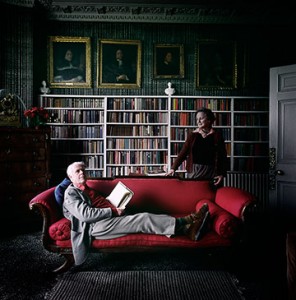 I have long been a devoted admirer of Powell’s work, and in recent years I have come to feel that Dance is even better than I originally thought it to be—that it is, in fact, one of the greatest novels of the twentieth century, perhaps even as good as Marcel Proust’s À la recherche du temps perdu, to which it is frequently and understandably compared. I reread the entire sequence every couple of years, always with increasing pleasure.
I have long been a devoted admirer of Powell’s work, and in recent years I have come to feel that Dance is even better than I originally thought it to be—that it is, in fact, one of the greatest novels of the twentieth century, perhaps even as good as Marcel Proust’s À la recherche du temps perdu, to which it is frequently and understandably compared. I reread the entire sequence every couple of years, always with increasing pleasure.
In honor of that midlife conversion, I’ve decided to spend the next two weeks reprinting excerpts from Powell’s notebook in the form of daily almanac entries. I hope you find them as edifying as I did.
* * *
Excerpts from the first part of A Dance to the Music of Time, a seven-hour-long TV version of Anthony Powell’s twelve-volume cycle of novels, originally telecast in 1997 on Britain’s Channel 4. The four-part miniseries has never aired in this country:
An ArtsJournal Blog